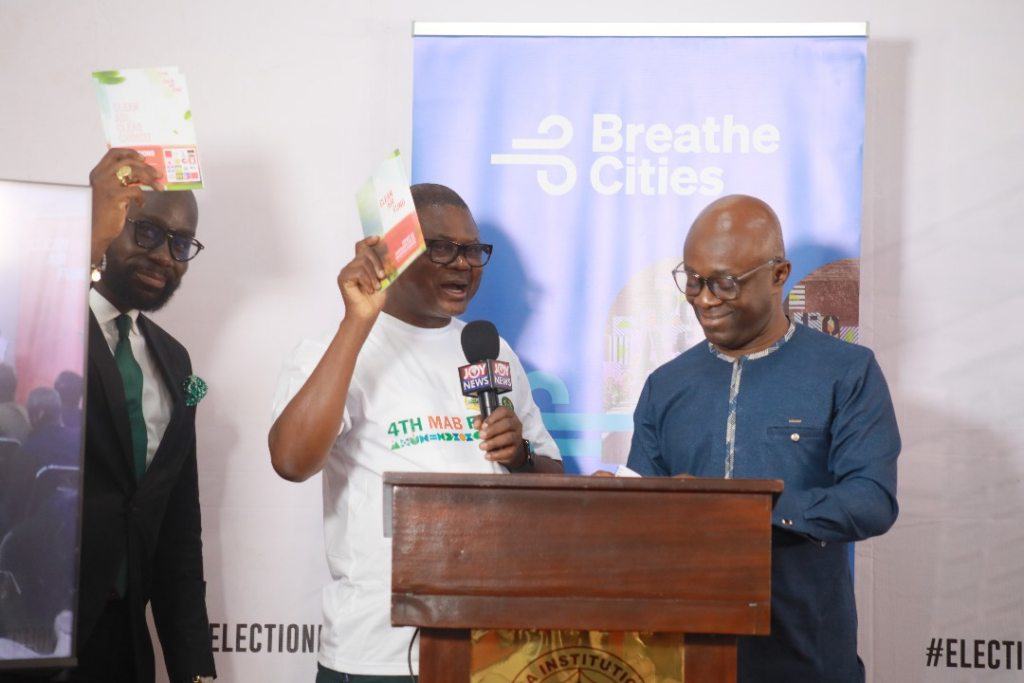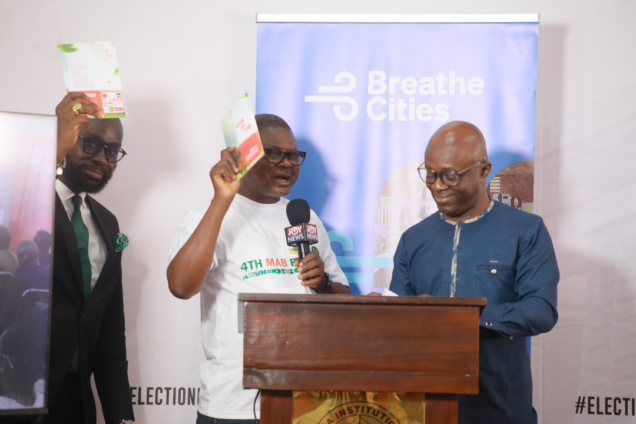
Audio By Carbonatix
Air pollution has become a silent public health crisis in Ghana, contributing to an alarming rise in respiratory diseases and other life-threatening conditions.
Studies reveal that particulate matter (PM2.5) alone is responsible for millions of deaths globally, making air pollution the second leading risk factor for death.
In Ghana’s urban areas, especially Accra, pollution levels are rising due to vehicle emissions, industrial activities, and waste burning.
To address these challenges, the Clean Air Fund launched its Clean Air Manual on November 27, 2024, during the National Dialogue on Clean Air.
The event, organised by JoyNews in collaboration with the Clean Air Fund and Breathe Cities, aimed to guide political parties in addressing air quality issues in their 2024 election manifestos.

Gaps in Air Quality Management
The manual highlights five critical gaps in Ghana’s approach to air pollution:
- Absence of a Comprehensive Air Quality Policy: Ghana lacks a national policy comparable to the U.S. Clean Air Act.
- Inadequate Local Data: Air quality monitoring is concentrated in Accra, leaving most of the country with limited data.
- No Routine Forecasts: Major cities lack regular air quality forecasts to inform the public.
- Low Public Awareness: Many Ghanaians are unaware of the health risks posed by air pollution.
- Limited Monitoring Equipment: Regulatory-grade air quality monitors are insufficient to capture the scale of the problem.
The contributors noted that despite air pollution’s devastating health and economic impacts, it is often overlooked in political campaigns.
“Air quality issues are conspicuously missing from campaigns. A review of previous manifestos of major political parties found no meaningful policy propositions addressing air pollution,” the manual states.
The Burden of Diseases
Dr Sandra Kwarteng-Owusu, a respiratory physician and contributor to the manual, emphasised the growing health crisis caused by air pollution.
“From my background as a respiratory physician, I’ve been worried about rising respiratory conditions. In Kumasi, 16% of adolescents aged 12 to 14 reported asthma symptoms, up from 5% two decades ago.
"This is concerning, as children are particularly vulnerable to the effects of poor air quality,” she said.

Dr. Kwarteng-Owusu also revealed that schools with the highest rates of asthma among students had higher pollution levels.
“For instance, some public schools practice open burning while children are on the compound. Such practices must stop, and policies need to be enforced,” she added.
A Call for Stronger Frameworks
John Kingsley Krugu, Executive Director of the Environmental Protection Agency (EPA), highlighted gaps in Ghana’s regulatory framework.
“We have a robust framework, but there’s no specific policy for air pollution. The Constitution, Environmental Policies, and the EPA Act all touch on air quality, but we need a dedicated policy.
"Parliament must pass the new bill, which emphasizes air quality, but its timeline remains uncertain,” he said.
Economic Implications of Air Pollution
Dr. Elvis Kyere-Gyeabour of the Clean Air Fund warned about the economic costs of neglecting air pollution.
“If we do nothing, we’ll spend more money on healthcare for children, pregnant women, and other vulnerable groups. There’s uneven resource allocation for air quality globally and locally.
"Taxes for sanitation, for instance, aren’t directed toward addressing air pollution or waste burning. We need to rethink how resources are allocated,” he said.
Hope for Political Will
Prof. Kofi A. Amegah, a contributor and researcher from the University of Cape Coast, described air pollution as a “ticking time bomb.”
“Political will is critical in addressing air quality. I hope this isn’t just rhetoric and that political parties, upon gaining power, will work with the EPA, academia, and civil society to tackle air pollution,” he said.
The Manual’s Contributors
The Clean Air Manual was developed by experts across academia and civil society, including:
- Dr. Sandra Kwarteng-Owusu (KNUST)
- Prof. Kofi A. Amegah (University of Cape Coast)
- Frederick Otu-Larbi (University of Energy and Natural Resources)
- Allison F. Hughes (University of Ghana)
- Desmond Appiah (Clean Air Fund, Ghana)
Looking Ahead
As Ghana heads toward the December 2024 elections, the Clean Air Manual offers a roadmap for political parties to prioritise air quality.
The launch serves as a reminder that addressing air pollution is not just a public health imperative but a political and economic one.
Latest Stories
-
Adom FM’s ‘Strictly Highlife’ lights up La Palm with rhythm and nostalgia in unforgettable experience
2 hours -
Ghana is rising again – Mahama declares
6 hours -
Firefighters subdue blaze at Accra’s Tudu, officials warn of busy fire season ahead
6 hours -
Luv FM’s Family Party In The Park ends in grand style at Rattray park
6 hours -
Mahama targets digital schools, universal healthcare, and food self-sufficiency in 2026
6 hours -
Ghana’s global image boosted by our world-acclaimed reset agenda – Mahama
7 hours -
Full text: Mahama’s New Year message to the nation
7 hours -
The foundation is laid; now we accelerate and expand in 2026 – Mahama
7 hours -
There is no NPP, CPP nor NDC Ghana, only one Ghana – Mahama
7 hours -
Eduwatch praises education financing gains but warns delays, teacher gaps could derail reforms
7 hours -
Kusaal Wikimedians take local language online in 14-day digital campaign
8 hours -
Stop interfering in each other’s roles – Bole-Bamboi MP appeals to traditional rulers for peace
8 hours -
Playback: President Mahama addresses the nation in New Year message
9 hours -
Industrial and Commercial Workers’ Union call for strong work ethics, economic participation in 2026 new year message
11 hours -
Crossover Joy: Churches in Ghana welcome 2026 with fire and faith
11 hours

